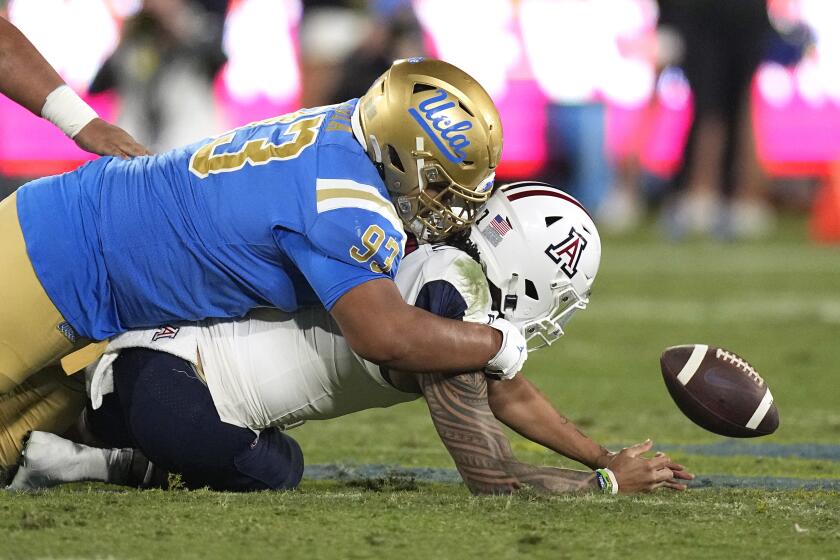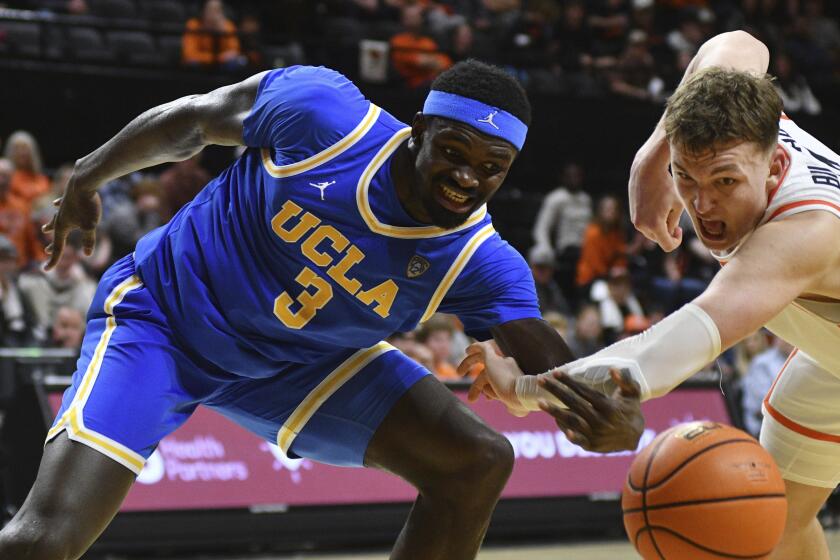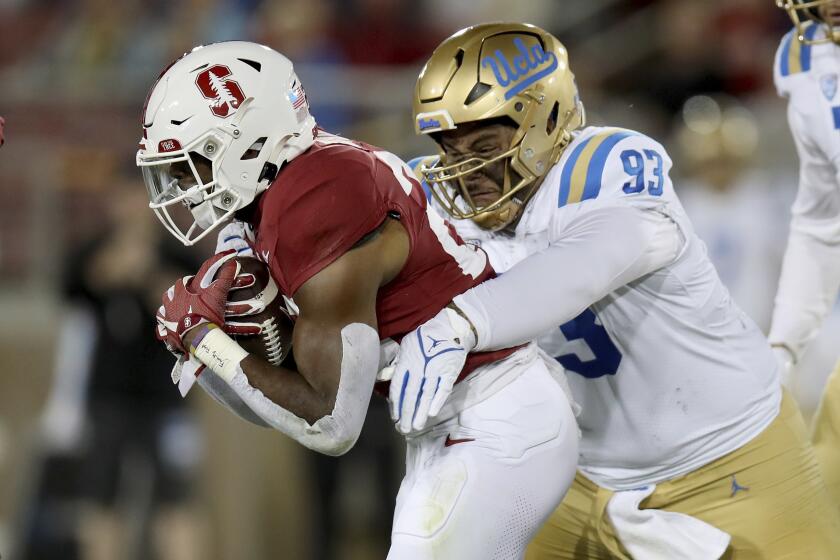THE THINKER
On a Thursday night, halfway through a crumbling season, the UCLA football team gathers behind closed doors in a meeting room beside the practice field. The mood is rowdy, a clatter of jokes and insults, until Karl Dorrell walks in.
Dressed in a loose, gray T-shirt and black sweatpants, the coach begins softly, saying it is time to “contemplate some things,” then recites a poem. “If you think you are beaten, you are ... “ His players wait, maybe sensing what comes next.
This is not the Dorrell fans usually see, the pokerfaced guy on the sideline who rarely shows emotion.
First he paces. Then he starts clicking the cap of the red pen in his hand, edgy, irritated. All the while, his voice grows louder.
“I’m asking,” he stops and growls, “do you think we’re in bad shape?”
Pointing at one player, then another, he keeps asking: “Do you believe?” His words now ricochet off walls adorned with photographs of past All-Americans, ghosts of a better era.
Karl Dorrell, of all people, is thundering.
“We will fight.”
After starting 4-1 this fall, UCLA has lost four straight, including Saturday’s 38-24 defeat at California. Dorrell’s play calling and clock management have come into question, detractors wondering whether the young coach is still learning on the job while losing games.
To some degree, he understands all this. What mystifies him is another recurring complaint -- his style.
Fans don’t seem to want a coach who politely thanks Notre Dame for the “experience” after losing in South Bend. When UCLA starts the Cal game with a string of holding penalties, they want him charging onto the field to chew guys out. Instead, Dorrell appears restrained to the point of detachment, what he calls “my usual stoic self.”
It doesn’t help that, across town at USC, the preternaturally gregarious Pete Carroll is on a roll.
“If UCLA was winning national championships, people would look at Karl Dorrell as this extremely disciplined, poised coach,” says Michael Young, a supporter and former college teammate. “But when you’re not winning, it looks like you don’t care.”
A major college coach who doesn’t care? Dorrell shakes his head at that one.
People close to him insist there is a side of his personality -- intense, competitive, even loud -- that reveals itself mostly in private. Players point to their Thursday night meetings, such as the one before the Cal game, as an example.
“He talks when he needs to,” center Robert Chai says. “He gets worked up and you can see the fire in his eyes.”
That, apparently, is the paradox of the man. What you see and what you don’t.
*
Kim Dorrell realizes her husband is not the easiest person to gauge.
“He’s a thinker and it’s hard for a lot of people to read him,” she says. “My friend calls him the man of mystery.”
This sort of unspoken determination made him a star at UCLA in the mid-1980s, a receiver who ran precise routes to compensate for average speed. Dorrell worked tirelessly in practice and always believed the best way to compete was to maintain an even keel, never get too high or too low.
“He kept his emotions on the inside as a college kid, so I’m not surprised he’s that way as a coach,” former teammate Mike Sherrard says. “Composed all the time.”
IBM offered him a job out of college, but his coach at the time, Terry Donahue, persuaded him to stick with football, suspecting his work ethic and knowledge of the game would make a perfect fit.
As for Dorrell’s reticence, Donahue adds: “I played for a guy named Tommy Prothro, and people thought he walked on water. Tommy Prothro stood there with a hat, smoking a cigarette. He never showed any emotion on the field. Rarely, if ever, did he show any emotion in the locker room.”
Only two years after starting as a UCLA graduate assistant, Dorrell became the offensive coordinator at Northern Arizona, where Kim was in her final semester as a student. She thought he looked nice and they shared certain traits, both detail-oriented. She soon learned something else about him.
“He doesn’t need to show off to anyone,” she says. “He just goes about his business.”
As her husband climbed the coaching ranks, moving from Arizona State to Colorado to Washington, she watched a pattern develop. He would stick around the house in the off-season, content to play with their son and daughter, but when football came around, he inevitably turned inward.
“It just sends him into that thinking mode,” she says. “I give him his space because I know he’s thinking, ‘How do I fix this?’ ”
Kim also knows what people say about his personality; she hears it on the golf course and nearly everywhere else she goes. The other day, at physical therapy, a patient on the next table talked about it. She wanted to ask the guy: What do you know about my husband?
“That’s what kills me,” she says. “I don’t see him as dull and boring. I see him doing his job.”
*
Inside the locker room and weight room, the trainer’s room and all the meeting rooms -- everywhere a UCLA player goes -- a rectangular digital clock is on the wall. It is wired to a master clock, synchronized to the second.
Around this football team, being on time is a very big deal.
“Actually, when you’re on time, you’re late,” linebacker Christian Taylor says. “We usually try to get there early.”
This is Dorrell as quiet disciplinarian -- he sometimes uses the term “control freak” -- a characteristic that traces to childhood.
He grew up in a military family, his father a flight deck officer on aircraft carriers. The job left no room for goofing off, not with fighter jets hurtling past, and John Dorrell was a strict man. But he also spent long months at sea, leaving his wife to mind four boys and three girls.
Cora Dorrell kept order with large wooden spoons hanging on the wall, an ever-present threat to any child who so much as contemplated misbehaving.
“When you have seven kids, you can’t let them run wild,” she says. “I believe that you don’t spare the rod.”
The spoons made quite an impression, so much so that the Dorrell kids say they still buy a pair for their mother when they visit Tijuana, a family joke.
As the youngest, Karl watched siblings endure the wrath of the spoons and was smart enough to steer clear. A brother, Kent, recalls him as calm and dependable, eager to do chores. It was the same in school, where Dorrell kept to a select few friends. After class, he was the one who insisted they finish homework before going outside.
“He was always a smart, ahead-of-the-game kind of guy,” childhood pal Craig Galloway says. “When we got together and played football with kids in the neighborhood, he would be the quarterback, designing plays.”
Skip ahead to the winter of 2002, UCLA searching for a new coach. Wins and losses were only part of the equation. The Bruins had suffered through some ugly headlines, players charged with crimes that ranged from fighting to using handicapped placards for choice parking spots on campus.
Dorrell made an attractive candidate -- handsome, well-spoken and, as was often pointed out, African American -- but he was only 39 with no head coaching experience, so his hiring drew criticism. Some accused Athletic Director Dan Guerrero of turning cheap, choosing a guy he could get for an annual base salary of $600,000 in an era of million-dollar-plus hires. (By terms of a raise, he is making $850,000 this school year with “bonus opportunities” for another $505,000.)
Guerrero believed he had found a leader who would right the ship. In public, the new guy spoke vaguely of tradition and integrity. Behind the scenes, he laid down explicit rules about promptness and cellphones at team meetings.
“That’s a big no-no,” linebacker Taylor says. “Every once in a while a cellphone rings in a meeting and it gets real quiet. Everybody’s like, ‘No way!’ ”
As for larger issues, Dorrell simply told his players: “Don’t ever do anything to embarrass me or this team.” Not the type to scream, he reinforced this message with his own version of the wooden spoons.
That first season, when cornerback Marcus Cassel and quarterback John Sciarra were arrested and accused of separate misdemeanors, he suspended them. Lesser indiscretions resulted in players getting benched or staying after practice for extra running.
“I’m pretty firm that way,” Dorrell says. “It didn’t take long before they understood.”
The image of UCLA as an out-of-control program began to fade, but rules went only so far. There was another sort of work to be done.
*
The world saw him as clean-looking, a shaved head and bright smile, every shirt pressed, every pant leg creased. Dorrell took some public ribbing for his spit-and-polish image during that first season when the Bruins finished 6-7, capped by a loss to Fresno State in the Silicon Valley Classic.
Within the team, players whispered that their coach -- coming off three seasons as a Denver Broncos assistant -- was too NFL, too businesslike.
When Dorrell caught wind of this, he says, “I was so distraught.”
Go back to his youth again, the long months his father spent at sea. The Dorrell kids missed their dad. “It was like a holiday when he came home,” Cora says. Family was of utmost importance, a dynamic magnified by the fact that the Dorrells crisscrossed the United States, moving from one naval base to another.
“You went to neighborhoods where you didn’t know anybody,” brother Kent says. “You tended to keep together.”
So when Dorrell faced a crisis early in his UCLA tenure, he drew upon this experience to make something of a personal transformation.
“We just had so much dysfunction,” he says, describing his team as if it were a family. “I needed to stop worrying about how to run this play or that play. I needed to get to know these guys.”
No small task for a man who might have been working at IBM, a coach who saw himself as chief executive, delegating authority to assistants, keeping watch from on high. After the 2003 season, he made a point of meeting with each of his 90-plus returning players. Later, he established off-season rap sessions known as “Football 101.”
“I saw him change a lot,” receiver Junior Taylor says. “He got to know us and we got to know him. It brought us together.”
There were bumps in the road, run-ins with players and assistants. To this day, Dorrell still delegates, still tends to stand apart in practice, monitoring.
Yet the players have learned to read his tone of voice and facial expressions. Junior Taylor explains: “You can tell when you did good, when you screwed up. Most people can’t see it, but we can.”
And Dorrell has learned to read his team. After the 2003 season, it seemed that players weren’t responding to certain assistants, that maybe he had erred in rushing to assemble a staff. The coach made key changes.
“It made a big difference,” Christian Taylor says. “He definitely listened to us.”
*
What you see and what you don’t.
It is midday and Dorrell sits on a broad leather couch in his office, sunlight filtering through tall windows. His polo shirt and slacks are predictably neat, as is his desk. Brightly colored kids’ drawings are taped to the door.
For much of an hour, he is gracious and personable for a coach under pressure, his team in danger of missing a bowl game. Only when asked about his public persona -- the image he shows to the world -- does he smile in a way that suggests a hint of frustration.
“Style,” he says. “Right.”
Look back through football history at the different kinds of coaches who have succeeded. Upbeat types, authoritarians, guys who remained stoic. “Even more stoic than me,” he says.
But in this modern era, the job is wired directly to 24-hour sports channels and talk radio and Internet sites. Donahue muses: “Any time you have more exposure, like coaches are getting, you open yourself up. They find your Achilles’ heel ... whatever it is.”
The entertainment factor doesn’t stop there. Los Angeles fans so immersed in the movie industry want colorful coaches -- wisecracking John McKay, boisterous Tom Lasorda, and Phil Jackson as the Zen Master. In this lineup, Dorrell is odd man out.
Each Saturday, television cameras scan the sideline, closing in on him. His expression rarely changes, adding more fuel to subsequent grumblings on fan websites, including dumpdorrell.com.
“I like who I am,” he says. “Very family oriented. Very private.”
Anything else -- jumping up and down, high-fiving players, berating officials -- would be phony, he believes. His team would sniff it out and so would fans. But couldn’t he show a little more of the person his friends and team know?
The coach who preaches to his players behind closed doors, wanting so much to mold them into family. The guy who can sit back on a couch at lunch and just talk.
No, he explains, “that’s the private part. For the people who really know me.”
Two days after their emotional Thursday night meeting, the Bruins take the field at Cal. They come out energized, in sharp contrast to the previous week’s flat performance against Washington State, but after sticking close for two quarters ultimately stumble with too many missed opportunities, not enough big plays.
And what about that yelling and growling -- Do you believe? -- from two nights earlier?
The emotions remain tucked behind Dorrell’s game face. No extravagant smiles or grimaces as he walks the sideline. Hard to tell, at any given moment, whether his team has just fumbled or scored a touchdown.
*
(BEGIN TEXT OF INFOBOX)
Hit and miss
UCLA outscored its opponents, 134-62, in its first games and has been outscored, 125-76, in last four.
FIRST FIVE GAMES (4-1)
* Sept. 2 vs. Utah...W 31-10
* Sept. 9 vs. Rice...W 26-16
* Sept. 23 at Washington...L 29-19
* Sept. 30 vs. Stanford...W 31-0
* Oct. 7 vs. Arizona...W 27-7
LAST FOUR GAMES (0-4)
* Oct. 14 at Oregon...L 30-20
* Oct. 21 at Notre Dame...L 20-17
* Oct. 28 vs. Washington State...L 37-15
* Nov. 4 at California...L 38-24
Source: uclabruins.com
Go beyond the scoreboard
Get the latest on L.A.'s teams in the daily Sports Report newsletter.
You may occasionally receive promotional content from the Los Angeles Times.




